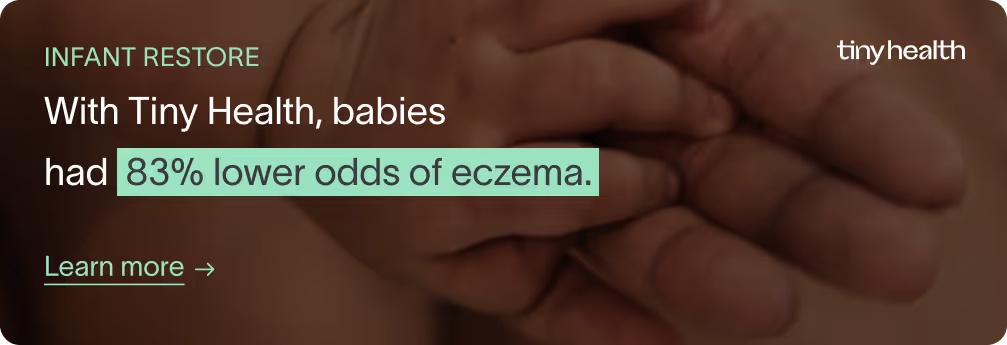One of the most common reasons parents come to Tiny Health is to address baby eczema. Perhaps they’ve tried all kinds of topical creams or ointments, their practitioner is recommending steroid treatment, or they just want to get to the bottom of their concerns. And it’s no wonder, with eczema’s dry, itchy patches that can cause you and your little one so much distress.
Eczema is a complex condition and its exact cause isn’t known, though genetics and environmental triggers often play a role. Recent studies have shed new light on what causes eczema in babies, and one key factor seems to lie in the gut. Keep reading to learn more about baby eczema and the gut microbiome connection.
Understanding eczema in babies
Eczema is a skin condition characterized by inflamed, itchy, and dry patches of skin.
This uncomfortable condition can make normal activities like playing and sleeping more difficult for your baby. Unfortunately, it is hard to cure and may come and go, with flare ups that can be triggered by a range of things, from dry skin during colder months to food allergies or even a scratchy sweater or blanket.
60% of eczema cases begin in the first year of life [1], making it one of the most common skin conditions in babies and toddlers. Unfortunately, baby eczema often precedes the arrival of other immune conditions, such as allergies, asthma, and allergic rhinitis. This cluster of immune conditions is called the atopic march.
When a baby has eczema their immune system enters a state of high alert, and this makes it more likely to over-react to triggers in the future. Studies have found that this heightened state may be the reason for the increased risk for the other conditions of atopic march, such as allergies [2] and asthma [3], [4].
Causes of eczema in babies
As we mentioned before, the causes of baby eczema aren’t fully understood. However, eczema can be prompted by a variety of things:
- Genetics - Babies who have one parent with eczema are 2-3 times more likely to develop it as a baby or young child [5].
- Irritating detergents or soaps - Soap ingredients such as fragrances and preservatives may further disrupt the skin barrier, leaving it vulnerable to flare ups [6], [7].
- Skin microbiome imbalances - The skin has a microbiome, too! Babies who develop eczema may be experiencing imbalances in their skin microbiome, with a shift away from the normal skin bacterial communities, which are mostly Staphylococcus[8], [9].
The gut-skin axis - your skin’s connection to your gut microbiome
Recent research has found that the source of your eczema woes may also trace back to your gut. This connection, called the “gut-skin-axis” is a pathway that allows communication between your immune system, gut barrier, and the microbes within your gut [10], [11], [12], [13], [14]. Here’s how your baby’s gut may increase their likelihood of eczema:
- Allergy exposure within the gut - Like we mentioned above, eczema and allergies often go hand in hand. Eating foods that cause an allergic reaction can further heighten the immune response, potentially leading to increased skin inflammation that can make eczema more uncomfortable [15], [16].
- Gut barrier weakness - The barrier within your gut allows your system to pick and choose what it allows to reach your blood circulation. Healthy gut metabolites like short-chain fatty acids? Yes, please! However, there are other things like toxins and bacteria themselves, that the gut barrier holds back [17]. Increased permeability of this barrier has been detected in those with eczema, making it more likely that unfavorable things may cross [18].
- Gut issues causing eczema - Interestingly, the microbes within your gut may also play a major role in eczema. We’ll talk more about this eczema and gut health connection below.
Identifying an eczema signature in the gut microbiome
The millions of microbes within your gut may have the power to protect your baby from or predispose your baby to eczema. Researchers have sought to find connections between specific bacterial species and your baby’s eczema. Their studies on gut health and eczema have found:
- Increased Akkermansia muciniphila - These beneficial bacteria play a crucial role in maintaining a robust gut barrier [19], [20]. For adults, the presence of A. muciniphila is not only beneficial but may also provide protection against obesity [21], [22], [23]. Interestingly, in infants and children with eczema, levels of A. muciniphila show significant variation compared to those without the condition [24], [25].
- Increased Enterobacteriaceae - These are mainly unfriendly bacteria that many of us have at low levels in the gut. This family of bacteria is often resistant to antibiotics. While low levels of Enterobacteriaceae in little ones can help train their immune system, too much has been linked to eczema in babies younger than 3 months [26].
- Decreased Faecalibacterium - These are beneficial bacteria that produce butyrate, a helpful bacterial metabolite that can strengthen the gut barrier [27] and even support healthy blood sugar levels [28]. Babies with eczema have lower levels between the ages of 3 weeks to 12 months, compared with healthy babies [24], [26].
Support a healthy gut to address your baby’s eczema
The first step towards understanding baby eczema and the gut microbiome connection is a Tiny Health gut test. The baby gut microbiome develops rapidly in their first 1,000 days of life. Taking a look at your baby’s gut microbiome between 3-6 months of age allows us to determine if they are at an increased risk of developing eczema. From there, there are several ways you can set your baby’s microbiome up for success. By measuring early and taking action, you may reduce your baby's risk of eczema or severity of symptoms.
Feed your baby’s beneficial bacteria with HMOs
One of the main sources of food for beneficial gut bacteria in babies is human milk oligosaccharides, or HMOs. Luckily, these sugars are very plentiful in breast milk and can do a world of good for breastfed babies. Not breastfeeding? HMOs are present in a variety of supplements and formulas for you to choose from.
Consider a probiotic
You may be wondering, does my baby need a probiotic? If your baby’s gut test shows they are lacking important bacteria like Bifidobacterium, a probiotic may be recommended. These bacteria have special functions like HMO digestion and they also help your baby’s immune system to mature [29].
Probiotics containing specific strains of bacteria like Lactobacillus rhamnosus GG may also be useful, as they have been shown to specifically help with eczema symptoms [30], [31]. But remember to test before starting a probiotic so you can know exactly which strains your baby’s gut needs. That way, you won’t be guessing and giving them something that they already have in abundance.
Boost microbiome diversity
You may have heard that the best way to grow a strong immune system is to go play in the dirt. As it turns out, this is especially true for the gut microbiome, as this allows a diversity of microbes to populate your gut. You can also diversify your microbes by cuddling up with pets, visiting local farm animals, and introducing new foods.
Set the foundation for lifelong health
Tiny Health's clinical trial, Infant Restore, found that a 6-month intervention program reduced the odds of eczema in C-section babies by 83%. If your little one is just starting out, supporting their gut microbiome early on may help protect against eczema and set the foundation for long-term health. Download our Infant Restore White Paper to learn more.




